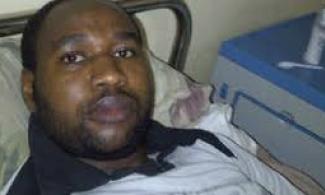
Renouncing Islam is apostasy. And apostasy is a crime punishable by death.
The case Mubarak Bala, a Nigerian who renounced Islam and became an atheist is a clear indication of the precarious situation of ex-Muslims in the region. Bala is from the sharia state of Kano where islamic theocracy rules. Bala's renunciation of muslim faith did not go down well with the family members. They thought he was out of his senses and forcefully took him to a mental hospital for treatment.

Fortunately, Bala, from his hospital bed, managed to get out some message asking for help. He drew the attention of his online friends to his predicament. His friends responded by mobilizing local and international support. Bala was eventually released from the hospital. He lives in hiding and continues to fear for his life.
Yes, Bala, we can say to some degree is free but other ex-Muslims in Nigeria, and in other parts of Africa are not. Ex-Muslims in the region live in bondage. Leaving Islam is like passing a death sentence on oneself. Ex-Muslims are invisible thanks to sharia law that rules in the minds and shapes the morals people in muslim communities.
Bala was lucky that some freethought and human rights groups got to know about his situation on time and came to his help. Other ex-Muslims are not that fortunate. They suffer and die in silence without anyone's knowledge. Should we allow this to continue? No, we should not.
Ex-Muslims are tortured and abused with impunity. They are treated as persons without human rights. Ex-Muslims in Africa live anonymous life. They cannot openly identify themselves as ex-Muslims. They live in constant fear of their lives. Ex-Muslims are always worried that friends or family members might get to know that they have abandoned their faith in Islam-that they no longer believe in Allah-or in the prophethood of Muhammed.
Ex-Muslims do not enjoy the right to freedom of religion or belief because there is no freedom of religion under sharia. Instead what obtains in sharia states is 'unfreedom' of religion or rather freedom to profess one religion, and that is Islam. Muslims are compelled to profess islamic faith for life and forever. Renouncing Islam is apostasy. And apostasy is a crime punishable by death.
Also the whole idea of family and community honour is defined on the basis of Islam. So, renouncing Islam is dishonouring the family and community. And dishonouring the family is a serious offence that could lead to the killing of the person who renounces Islam. Simply, any one who renounces Islam deserves no mercy. The person is treated without compassion.
The case Meriam Ibrahim, a Sudanese woman born to a Muslim father but raised by her christian mother clearly illustrates this point. Ms Ibrahim married a christian man from South Sudan. She professes Christianity. To avoid incurring 'the wrath of Allah', her family members reported her to the Islamic establishment and she was charged for apostasy. And in April, an islamic court in Khartoum sentenced her to death by hanging.
What this shows is that a person who is born to a Muslim father is bound to profess Islam even if the mother is of another religion. Anyone who is born to a Muslim father cannot change his or her religion, cannot renounce Islam. Renouncing Islam is on the pain of death.
Somebody should tell me again that there is no compulsion in Islam.
There is. If there is no compulsion, people born to Muslim parents should be free to renounce Islam or convert to any religion of their choice without being persecuted.
Strictly speaking, in Muslim countries and communities, there are two places that ex-Muslims can be-in the closet or in the grave. Since the closet is not an actual space, one can say that there is one place an ex-Muslim can be- in the grave. Under sharia, ex-Muslims do not have the rights to freedom of religion, freedom of expression and associations, and freedom of life. This has to change. We need to join efforts and improve the situation of ex-Muslims in Africa
Secularists and human rights campaigners need to rise up to the challenge of promoting the human rights of ex-Muslims in Africa. The time has come for us to break the silence over the rights of apostates in the region. We need to pressure African countries to take measures to uphold freedom of religion or belief as enshrined in their constitution particularly freedom to change one's religion and freedom to renounce a religious belief. African states should be made to understand that freedom of religion makes no sense without respecting the rights of individuals to abandon Islam, profess other religions or no religion. There is no freedom of religion if a person is compelled to profess Islam because the father is a Muslim. There is no freedom of religion in countries where apostasy or blasphemy is a crime.
African states must be made to understand that professing a religion is not inherited. Professing a religion is by choice not by the force of state or family. Professing or not professing a religion is a human right. The true test of states' commitment to freedom of religion or belief
is how they treat ex-Muslims, and whether they recognise the rights of those who renounce Islam or any other religion as human rights.
Let us work and campaign for the protection of the rights and dignity of ex-Muslims in Africa whether they live in sharia states or not. This is what African renaissance is all about.
The views expressed in this article are the author’s own and do not reflect the editorial policy of SaharaReporters.